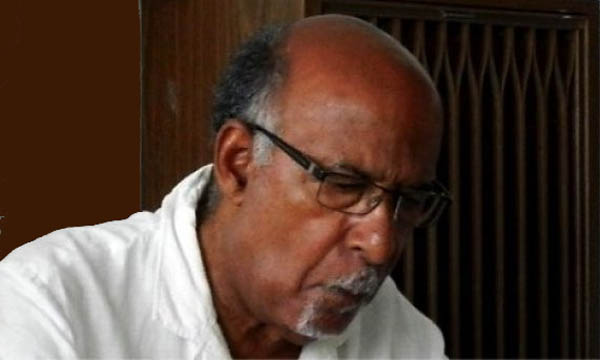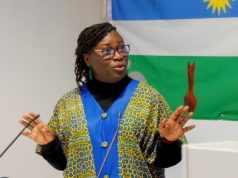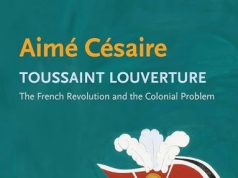

[Many thanks to Peter Jordens for bringing this item to our attention.] Guest editors Patricia Conflon (Université des Antilles) and Mourad Yelles (INALCO / LACNAD) invite you to send abstracts for a special issue of Archipélies (Nr. 22, December 2026). The deadline for submission of abstracts (English and/or French) is January 20, 2026. The organizing theme is:
- Daniel Boukman’s Tricontinental Traces – Poetic Marronage and Cultural Activism
- Tracées tricontinentales de Daniel Boukman – Marronnage poétique et militance culturelle
See excerpts from their description below and the full text, suggested topics, and guidelines at Archipélies.
Description: This call for submissions is dedicated to a Martinican figure whose personal journey, intellectual development, and artistic output are undoubtedly among the most remarkable of his generation. Indeed, if the title evokes Daniel Boukman’s “tricontinental traces”, it is to refer to an exceptional poetic and political journey, situated both in the long memory (that of the Maroons inscribing the “traces” of their resistance deep in the hills) and in a relatively more recent temporality (that of the Third World struggle, echoing the famous “Tricontinental” which symbolically united the peoples of Africa, Asia, and Latin America in 1966 in Havana). This issue therefore aims to explore the different facets of Daniel Boukman’s contribution to Caribbean literature, Creolity, anti-colonial movements, and cultural disalienation, between three continents with emblematic historical resonances: the Caribbean (America), metropolitan France (Europe), and Algeria (Africa).
While it is true that Western colonial expansion largely enabled it to secure the material foundations for unprecedented economic development, we are well aware of the tragic consequences of this historical process. By subjecting vast swathes of the world to the violence of its laws and interests, by enslaving and exploiting millions of men, women, and children across the globe by all means possible, the West first dismantled entire societies, thereby giving rise to multiple forms of resistance. In this regard, there is no shortage of examples of exceptional figures who, throughout recent and more distant history, have embodied the spirit of revolt and patriotic resistance. In Africa, we naturally think of Emir Abdelkader, Samori Touré or, closer to home, Patrice Lumumba and Nelson Mandela. In the Caribbean, we remember, of course, the admirable epic of Toussaint Louverture.
But by embarking on its imperialist adventure, the West also brutally plunged what would become the “Third World” into the turmoil of modern history. It is clear that it was precisely through the experience of terror and suffering imposed by the West that the “miraculous weapons” (Césaire) of cultural resilience. We think here of emblematic figures such as W. E. B. Du Bois, Alioune Diop, Cheikh Anta Diop and Léopold Sédar Senghor. And how can we not mention Frantz Fanon? All of these figures are important – especially in the current global context – to pass on to younger generations. They represent a long line of rebels with shining examples to follow, such as Daniel Boukman.
For nearly seven decades, the work of Daniel Edmond Athanase Blérald, alias Daniel Boukman, born in 1936 in Fort-de-France, Martinique, has continually illustrated the many facets of an identity forged in the crucible of poetic resistance, political struggles, and cultural activism. This began with the adoption of a pen name inspired by the hero of the Bois Caïman uprising in Saint-Domingue in 1794.
Daniel Boukman perfectly embodies the figure of the fearless rebel (a figure dear to Césaire in Et les chiens se taisaient), resolutely opposed to all forms of repression. This is admirably demonstrated, particularly on the Algerian side, by his refusal to obey the draft order during the Algerian War and his decision to join the ranks of the National Liberation Army (ALN) in 1961. The legal consequences of this insubordination led him to settle permanently in Algeria, where he lived until 1981. This decisive period in Daniel Boukman’s personal biography – recounted in Du Morne-des-Esses au Djebel (2021), one of Raphaël Confiant’s last novels – coincides with the beginning of his exploration of playwriting. A dramaturgy which, as Alvina Ruprecht points out, “is the product of a set of textual and aesthetic strategies dependent on an ideological vision that is unambiguous. Without claiming to renew the form of political theatre, it is part of the trend of anti-colonial and nationalist discourse inspired by Fanon […]“. (”Stratégies d’une dramaturgie politique : le théâtre anticolonial de Daniel Boukman”, L’Annuaire théâtral, Revue québécoise d’études théâtrales, 28/2000). Alongside cinema (which would become a lifelong passion for him), theatre became an essential vehicle for his poetic and political quest, insofar as it pushed him to develop new forms of expression. Through his various plays, Daniel Boukman expressed his political positions, ideological aims, and ethical values.
[. . .] As Jack Corzani notes in Littérature des Antilles-Guyane française (1978), Daniel Boukman therefore adopts a singular stance with regard to the “myth” of Negritude in the historical context of the evolution of this vast movement. [. . .]
In addition to his recent forays into sculpture (with his mas-kokos), Daniel Boukman’s artistic output includes more than forty publications and is characterised by its great diversity of genres. Indeed, it includes theatre, but also poetry, essays, textbooks, and a considerable number of stories (original, translated, or adapted). We note his preference for oral forms and, more generally, oral literature, as well as his distancing himself from the novel. These creative choices reveal a certain vision of “cultural activism” that deserves to be explored further, especially in light of his commitment to Creole. [. . .]
Proposals in English and/or French should be sent to: archipelies@univ-antilles.fr, p.conflongd@gmail.com and mourad_yelles@yahoo.fr.
For more information, see https://journals.openedition.org/archipelies/5002
[Photo of Daniel Boukman from https://www.madinin-art.net/de-nouveau-le-massacre/.]
[Many thanks to Peter Jordens for bringing this item to our attention.] Guest editors Patricia Conflon (Université des Antilles) and Mourad Yelles (INALCO / LACNAD) invite you to send abstracts for a special issue of Archipélies (Nr. 22, December 2026). The deadline for submission of abstracts (English and/or French) is January 20, 2026. The organizing theme





